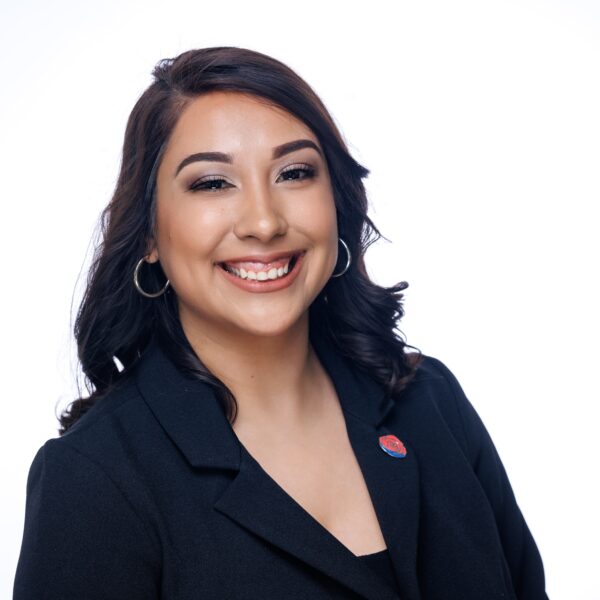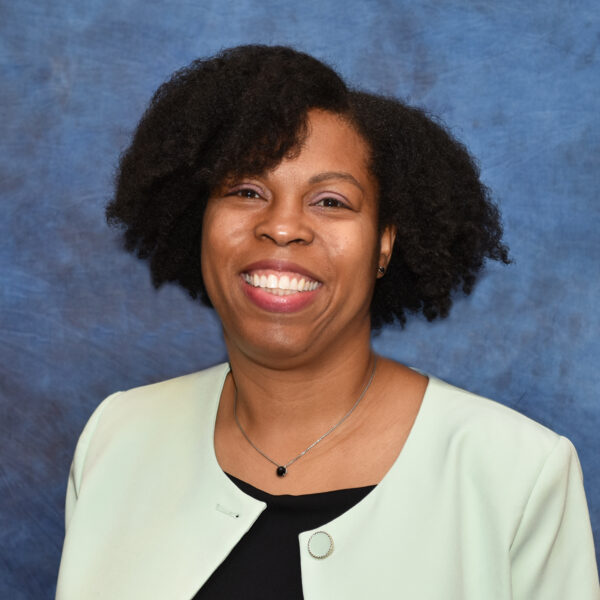Paying It Forward
First-Generation Higher Ed Professionals Empowering Current First-Gen Students
A Conversation with Dr. Shakima M. Clency, Adan Hussain, and Christin Kloski of the Kessler Scholars Collaborative.
The Kessler Scholars Collaborative supports and connects more than 1,000 Kessler Scholars across 16 institutions, transforming the college experience and supporting degree attainment for first-generation and limited-income students. The Kessler Scholars Program follows a cohort-based model. This means that, in addition to financial support, Kessler Scholars at each institution receive academic, professional, and personal guidance to help them not just access higher education but thrive across their undergraduate experience. The Judy and Fred Wilpon Family Foundation and Bloomberg Philanthropies provide support for the Collaborative and campus-based Kessler Scholars Programs.
The programs are led by dedicated professional staff at each of the 16 partner campuses, many of whom identify as first-generation graduates. In a 2024 survey, campus staff reflected on how this shared identity influenced their work with Kessler Scholars, one noting, “My approach and framework for supporting first-generation college students are informed by my personal experiences as a former first-gen college student.” Another staff member reflected, “Because I have been where all my scholars are, I can empathize with everything they are going through. I can identify with the feelings of imposter syndrome (which I also battle with every day), however, I also know how to combat those feelings to be successful!”
To mark this year’s First-Generation College Celebration on November 8, I interviewed several campus program leads and a member of the Collaborative’s senior leadership team who identify as first-generation college graduates about their work to support first-generation students. They shared insights about how their identity and experiences have influenced their approach and offered strategies to improve support for first-generation college students in the future.
This interview has been edited for clarity and length.
 Christin Kloski, Director, Office of Student Equity, Saint Mary’s College
Christin Kloski, Director, Office of Student Equity, Saint Mary’s College
I am the founding Director of the Office for Student Equity at Saint Mary’s College. I also serve as the First Gen Family Club advisor, working with students to spread awareness for first-generation student initiatives. As a first-generation and limited-income graduate, I am dedicated to advancing these student populations at Saint Mary’s College and beyond, and eager to keep learning best practices and advancing policies to promote equity in higher education.

Adan Hussain, Director of Kessler Scholars Program and UP Scholars Program, University of Michigan
I serve as the Director of the Kessler Scholars Program at the University of Michigan. As a former first-generation, limited-income student myself, I deeply understand the challenges and triumphs that come with navigating college. My own experiences fuel my passion for supporting students from similar backgrounds, and I have been working with first-generation college students for over a decade, helping them find their footing and thrive in higher education. One of my proudest achievements through this work has been founding the First-Generation Gateway Office at the University of Michigan which provides academic, social, and financial resources; and a place where students could connect and take pride in their first-generation identity.
 Shakima M. Clency, PhD – National Director of Campus Partnerships and Student Success, Kessler Scholars Collaborative
Shakima M. Clency, PhD – National Director of Campus Partnerships and Student Success, Kessler Scholars Collaborative
I serve as the National Director of Campus Partnerships and Student Success with the Kessler Scholars Collaborative. In this inaugural role, I coordinate engagement opportunities for Kessler Scholars students and alumni within the Collaborative network and support a generative community of practice to foster connections across institutional boundaries, resource sharing, and learning among the professional staff leading Kessler Scholars Programs at 16 partner institutions. Throughout my 18-plus years of experience in higher education, my work has consistently focused on increasing access to resources and equitable opportunities for students to develop new skills, discover themselves, and engage in transformative experiences that promote success in college and beyond. As a first-generation college graduate, my experiences inform this work.
What drew you to your position working with the Kessler Scholars Program?
Christin
I started my journey in higher education as a project coordinator at the University of Notre Dame, where I developed and led student programming initiatives and advised students from first-generation, limited-income, DACA, undocumented, and/or non-traditional backgrounds. During my time there, I frequently heard about the challenges students faced, which inspired me to explore ways to empower them to recognize and leverage their unique strengths. In my current role at the Office for Student Equity at Saint Mary’s College, we are always seeking innovative ways to empower students on their educational journey, address their needs, and also help them thrive in a supportive environment. The Kessler Scholars Program does just that. It provides a holistic approach to serving students and prepares them to serve in the world around them in the future.
Adan
Nationwide, first-generation students continue to face stigma tied to social class, which affects their confidence and self-perception. Unfortunately, too much research has focused on why these students struggle, rather than on what drives their success. I was drawn to the Kessler Scholars Program because it tackles these issues at a national level. Using an asset-based framework, my team and I support a cohort of scholars through mentorship, academic resources, and community-building, empowering them to thrive as first-generation students.
Shakima
My career in higher education began during my undergraduate years as a resident advisor, admissions tour guide, and orientation leader. These experiences connected me with mentors who inspired me to pursue a career in higher education. I have since held many administrative positions at several public and private institutions, working to lead initiatives, support institutional capacity building, and devote resources to empowering students operating at the margins. In 2018, I became the inaugural Associate Dean of Students for Student Empowerment and Director of First-Generation & Low-Income Students at Cornell University, where I led the formation and execution of the Kessler Scholars Program—a defining phase of my career.
As the Kessler Scholars Collaborative was taking shape in 2020, I felt a compelling pull to join the newly formed team and contribute to student-centered work in a different capacity. I was intrigued by the opportunity to work alongside outstanding colleagues leading Kessler Scholar Programs in diverse institutional settings to center and amplify the first-generation student experience, which was the focus of my doctoral dissertation research. Through my work, I have the privilege of visiting partner campuses and witnessing firsthand the project’s transformative impact on institutional practices and student support systems. I regularly connect with current scholars and alumni, listening to their powerful stories about how the program has enriched their college experiences and shaped their futures. This mission-driven work is not just about supporting individual students; it represents an extraordinary opportunity to scale first-generation student support, fundamentally reshaping the entire student experience and fostering lasting impact.
In what ways has your identity as a first-generation college graduate influenced your approach to creating and leading programs to support first-generation students, if at all?
Christin
Our First Gen Family Club students are pioneers. They can explore, make an impact, and become trailblazers if we continue to create space for them to have influence, voice their opinions, and advocate for change. Students are aware of what other students like or need, and can share insights to help develop programming. As a first-generation college graduate, I understand the importance of incorporating student voices. My approach to creating programs is to allow students to have their voices heard and to create spaces where they feel comfortable sharing their insights. In 2023, our office created a student advisory board, to give students who had previously served on our First Gen Family Club leadership team the opportunity to contribute to programming. The student advisory board taught our team how to handle the criticism of the students advising us with their honest opinions.
Adan
I was a first-generation college student, and I now have nearly 10 years of professional and research experience with first-generation college students. I became interested in researching first-generation college students when I started reading research papers about them, which in some ways were about me and in other ways, were not. I strongly identified with concepts like imposter syndrome and could see why helping students build social and cultural capital in college was important. Many first-gen students grapple with imposter syndrome, the persistent feeling of not being good enough or competent, despite clear evidence of their achievements. One way to address imposter syndrome is to normalize it and show just how common it is, and our Kessler Scholar alumni play an important role here. Alumni come back as speakers and volunteers and often share with students that they do not need to have everything figured out.
Shakima
During my first semester of college, I felt overwhelmed and unprepared to succeed. I was confused by the new terminology, did not understand how to access university resources, and was unfamiliar with faculty expectations. I now recognize that my limited exposure to college life shaped my experience—since my parents did not attend college—and I believe institutions can and should do more to ensure all students can succeed.
As a higher education practitioner now, when designing student support structures and programming, I aim to empower students to leverage their assets and community strengths while building the social and cultural capital needed to navigate the hidden curriculum of higher education and, later, the workforce or other unfamiliar spaces. As a Black woman from a working-class background, I feel a profound responsibility to disrupt exclusionary barriers and level the playing field, ensuring that marginalized students are positioned to achieve their academic and personal goals. Through my work with the Kessler Scholars Collaborative, I hope to partner with more employers and graduate programs to connect Kessler Scholars with highly coveted jobs and graduate school experiences to close the opportunity gap and help diversify the workforce.
In what ways has the Kessler Scholars Program influenced practices and policies for supporting first-generation students at your institution?
Christin
Saint Mary’s College continues to see an increase in first-generation enrollment each year and is focused on scaling support for these students to improve their retention rates and overall college experience. The Kessler Scholars Program has continued to support awareness of the needs of first-generation students, and has contributed to implementing the College’s strategic plan, Revere and Revise: Saint Mary’s College 2030, which includes a commitment to reducing economic and social barriers to success for our students. Through collaboration between the Office for Student Equity and the Kessler Scholars program, students are recognized as first-generation and limited-income and are provided programmatic and advising support.
Adan
The Kessler Scholars Program at the University of Michigan has significantly influenced a shift in the focus of policy and practice from simply increasing the number of first-generation students on campus to ensuring there is a robust support infrastructure in place once they arrive. This approach recognizes that recruitment is only the first step; the real work lies in providing the necessary resources for these students to thrive. During the recruitment process, we inform prospective Kessler Scholars about available resources both within and beyond the program, emphasizing that there are dedicated individuals on campus committed to their success. Going to college is exciting and can also be daunting, so we equip students with information and provide mentorship over the summer before they come to campus.
Based on your scholarship and experience, what more can institutions do to better support first-generation college students on their campus?
Christin
First, institutions should prioritize enhancing the overall student experience and improving success rates after initial enrollment. While overall enrollment rates might be points of pride for institutions, the direct support through development and institutional funds to support student-specific programming and scholarships is crucial to the retention and support of our first-generation students. Second, institutions should provide more financial support for first-generation students, such as increased scholarships, emergency grants, and funds for program activities to reduce financial barriers and support student participation. Finally, to create a sense of community, institutions should allocate resources to create dedicated space for first-generation students and provide direct support from staff from similar backgrounds.
Adan
Institutions must address some of the systemic barriers first-generation students face. Many universities are situated in towns and cities with a high cost of living, which makes accessing basic needs like affordable housing and healthy groceries a significant challenge. Institutions must prioritize housing affordability and ensure that diverse groups of students have easy access to nutritious food options. Additionally, career centers can play a vital role in supporting first-generation students by equipping them with the skills and resources needed to be competitive in the job market. This could include workshops on resume building, interview preparation, and networking opportunities tailored specifically for first-generation students. By taking these steps, universities can create a more supportive environment that not only addresses the immediate challenges first-generation students face but also empowers them to thrive academically and professionally.
Shakima
While progress has slowly been made towards equitable access for first-generation students, particularly at highly selective institutions, challenges persist due to discriminatory ideologies, exclusionary practices, and ongoing socio-political tensions, which hinder efforts to create greater access and inclusive educational environments. More recently, restrictions on race-conscious admissions and changes to the redesigned Free Application for Federal Student Aid (FAFSA) have exacerbated the decline in applications from students of color, many of whom are first-generation. Despite these challenges, college administrators must act as empowerment agents to promote student success and drive institutional transformation.
Given the systemic inequities in higher education, a multifaceted approach is essential to help address the most pressing issues facing this population. This includes leading data collection to identify equity gaps, centering first-generation student experiences, and implementing strategic actions to dismantle institutional barriers that impede success, particularly for underserved populations. Additionally, expanding support structures—such as peer mentoring, asset-based programming, engagement in high-impact educational practices, and social capital development—can effectively address opportunity gaps.